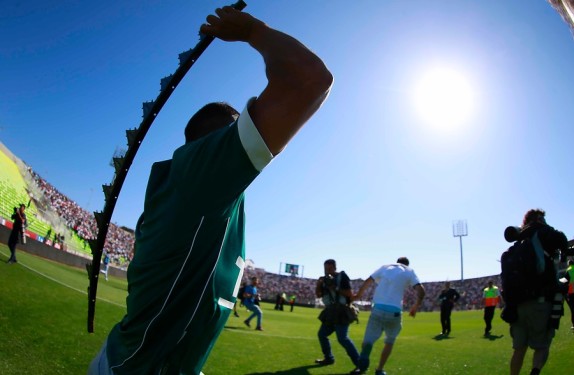After a ninety-nine year wait for silverware, Alexis Sanchez coolly chipped home from twelve yards to give Chile victory over Argentina and win the 2015 Copa America on home turf. The Chilean national team followed this up with victories over Brazil and Peru to get off to a good start to World Cup qualifying for Russia 2018. There was even a chance before the games with Colombia and Uruguay that Chile could end the year as the number one side in the world. The golden generation of Chilean football had delivered and were continuing to impress.
Given all this, many would call this the greatest year in Chilean football history and if you speak purely about what the national team has achieved then you’d probably be right. Nevertheless, the various scandals that have blighted Chilean football in 2015 mean it actually feels like one of the worst for many.
During the Copa America, star midfielder Arturo Vidal made worldwide headlines for all the wrong reasons when he crashed a Ferrari under the influence of alcohol in the early hours of the morning after a night at a casino. He first published a video on social media pleading his innocence before it became clear that all evidence was against him. He then faced the cameras and cried some crocodile tears, presumably to garner sympathy. He was instantly forgiven by some and Chile’s victories on the pitch certainly helped to defuse some of the hostility towards him from his fellow countrymen.
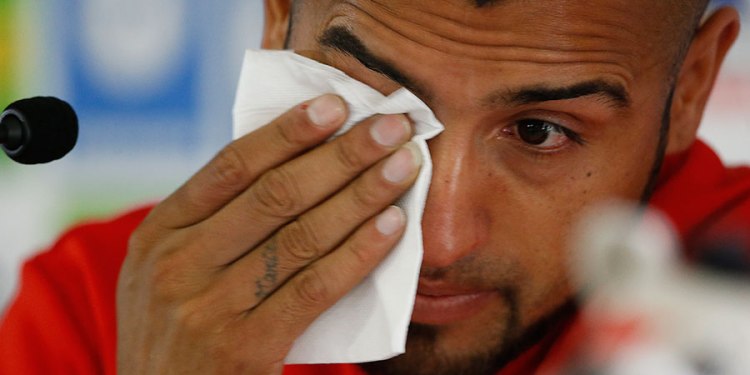
Shortly after the Copa America triumph, fellow national team midfielder David Pizarro announced he would return home from Italy and sign for his boyhood club Santiago Wanderers. Wanderers had just missed out on the Chilean title at the end of 2014 and had qualified for the Copa Sudamericana. Pizarro’s homecoming and unveiling to the Valparaiso-based side saw the prodigal son greeted by thousands of fans inside the Elias Figueroa stadium. Figueroa, widely regarded as Chile’s greatest ever player, welcomed home the arrival of one Chile’s most successful exports.
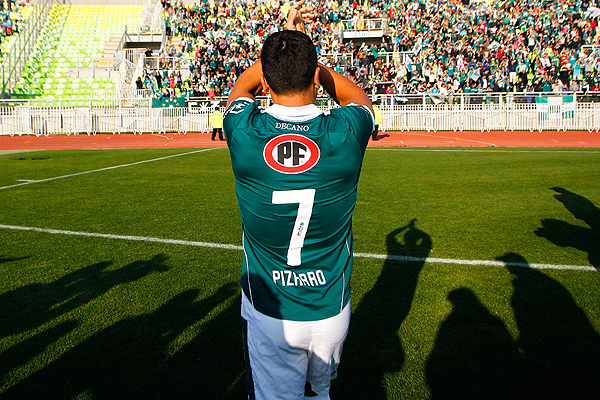
It didn’t take long for the situation to turn sour. Pizarro’s debut was delayed due to injury and he became increasingly frustrated by the quality of medical treatment he was receiving. Whilst he was trying to return to fitness, Wanderers exited the Copa Sudamericana and were already languishing in mid-table in what is one of the shortest ever Chilean league tournaments. Pizarro made a couple of appearances before breaking down again and hitting out again in the press. He was critical of the lack of quality in the Chilean league and was dismayed by the low attendances that have surprisingly fallen even further since the Copa America triumph. He also seemed unhappy about the various social issues in his home country and was reportedly keen on a move back to Italy.
As the year progressed came the news that the president of the Chilean FA Sergio Jadue was wanted by the FBI for his role in the corruption scandal that has rocked FIFA and CONMEBOL this year. Jadue is also being investigated in Chile for illegal salary payments to members of the association and the Chilean tax authorities want to speak to him about his income tax returns for the past three years. Jadue is said to be helping the FBI with their investigations, but there is no doubt that Chilean and South American football has been tarnished by his actions.
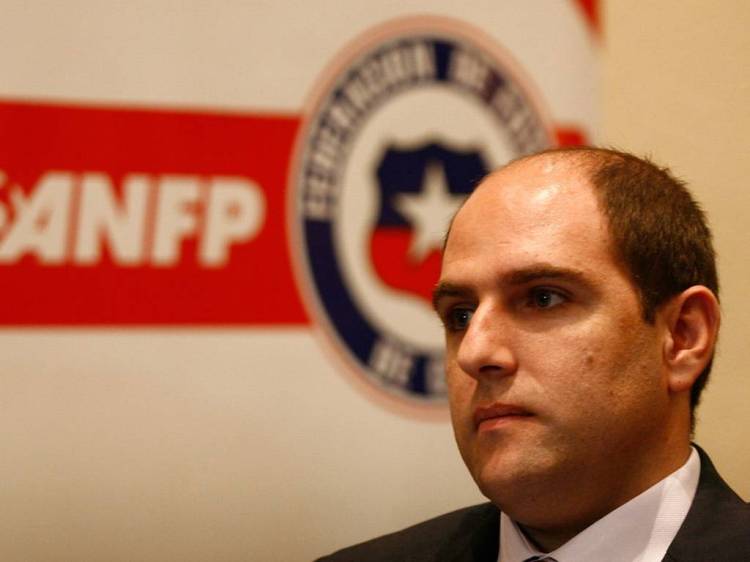
November also saw two key players from Chile’s biggest club, Esteban Paredes and Justo Villar of Colo Colo, questioned by police for possession of stolen goods. A couple of weeks later Universidad Catolica midfielder Michael Rios was arrested on suspicion of illegally trafficking twenty tonnes of dried fruit (originally reported as drugs). The Chilean club season was coming to a close, but the football was mostly uninspiring while the title was contested between a dull and dreary Colo Colo side and a Universidad Catolica team that were incapable of handling pressure when it really mattered to the point it was hard to respect them despite their attacking intent.
The Chilean club game has been going downhill fast for a few years now, but this year has felt like a real nadir. Not one Chilean side made it past the group stages of the Copa Libertadores and all of Chile’s representatives were knocked out of the Copa Sudamericana before the last sixteen. The last really competitive club side Chile produced in either of the continents’ club competitions was Jorge Sampaoli’s iconic Universidad de Chile side of 2011-12.
Then came Santiago Wanderers versus Colo Colo in Valparaiso on Sunday 6th November. The match was being played at 5 pm local time whilst Audax Italiano took on Universidad Catolica simultaneously. Colo Colo knew they just had to better or match Universidad Catolica’s result to become champions for the thirty-first time. UC were hoping for Colo Colo to slip-up and they would take advantage with victory in La Florida, Santiago. Incidents in the streets of Valparaiso’s before the match had already marred the occasion, but things were about to get worse.
As the teams prepared for kick off, referee Enrique Osses noticed that a number of Colo Colo fans had managed to get on the track around the pitch. Colo Colo players rushed over to remonstrate with their own supporters, but as they were doing so all hell broke loose with hooligans from both sides fighting each other on and around the pitch. Metal bars, fireworks, gates with sharp edges were all used as weapons whilst CDF (Chile’s cable football broadcaster) cameras were smashed up, their cameramen and photographers attacked and innocent bystanders were struck by flying objects. The violence was broadcast live across the nation in all its ugly glory (https://www.youtube.com/watch?v=87oVoBRrJ1k) The police finally arrived on the scene about fifteen minutes too late and both sets of fans scurried cowardly back to the stands. Needless to say, the match was soon suspended and farcical scenes followed later when Colo Colo players were seen celebrating their title success on the pitch with a handful of fans and officials as news came through that Universidad Catolica had lost to Audax.
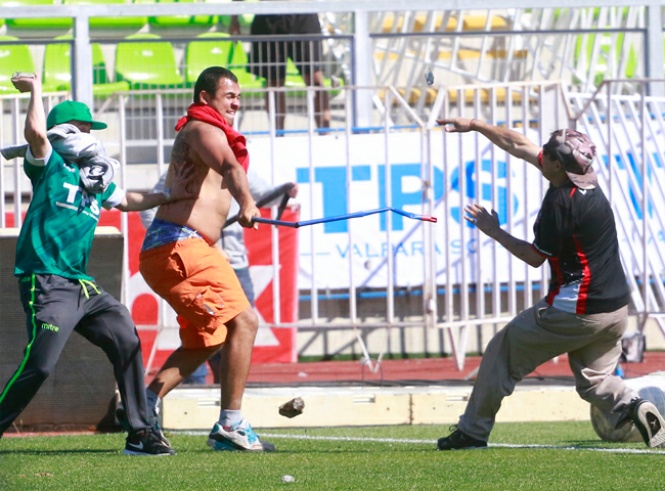
This incident isn’t the only act of violence inside Chilean stadiums this year but it was certainly the most high profile. The Chilean government introduced a plan a couple of years ago that banned a lot of fan paraphernalia being allowed into the stadium including musical instruments, which took away that tuneful feel you get with South American crowds. Ticket prices saw an increase and the sale of tickets were stricter. Fans are also obliged to show their national ID card when they enter the stadium and it is scanned by an official before you hand your ticket over. The result of these measures saw less violent incidents in the stands, but many matches were played in either empty stadiums or before crowds that seemed mostly sedated. Sunday’s debacle was arguably a result of relaxing some of these strict measures that had been heavily protested against.
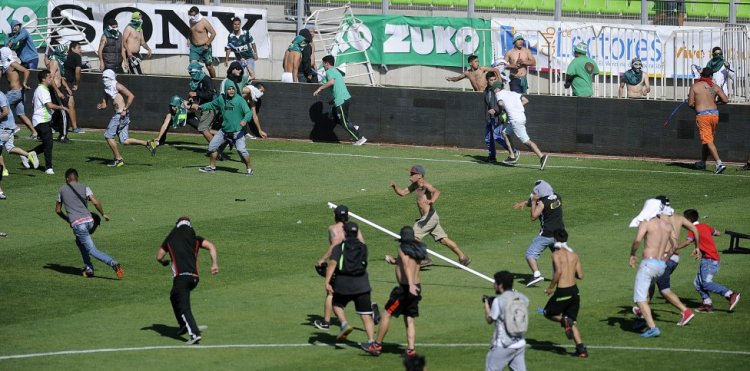
If Chilean football is to advance then a number of issues need to be dealt with, some of which aren’t the fault of football culture alone. When the head of the sport in your country is arrested for criminal activity, your star midfielder is arrested for drink driving and then let off lightly by those above him and even the country’s president has had her fair share of controversies then you could argue that it is time for everybody involved in Chilean football and government to have a good hard look at themselves.
